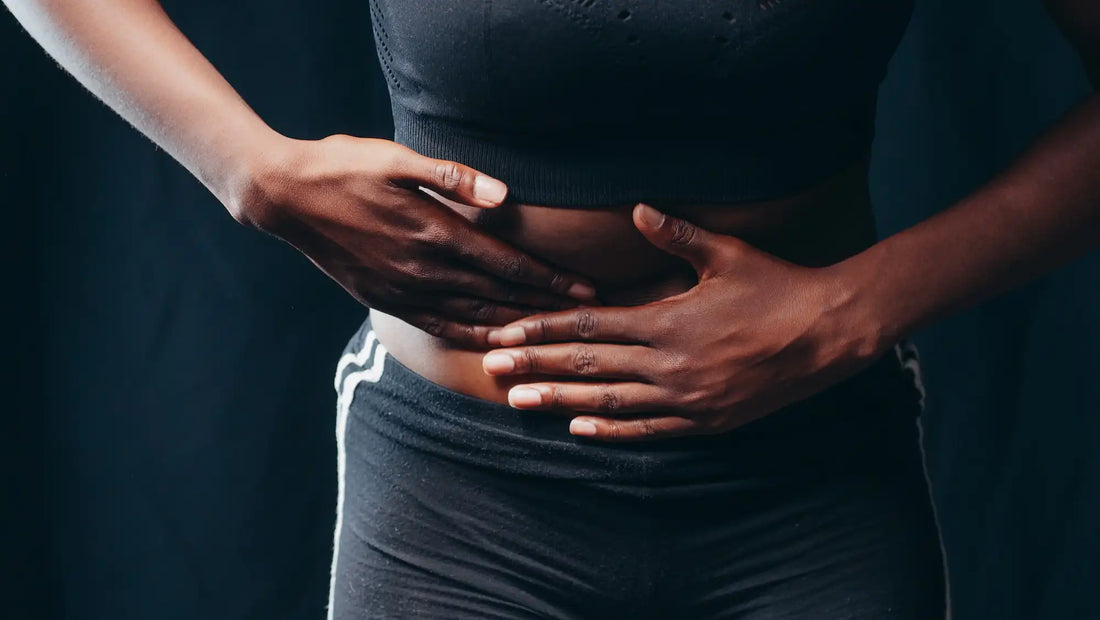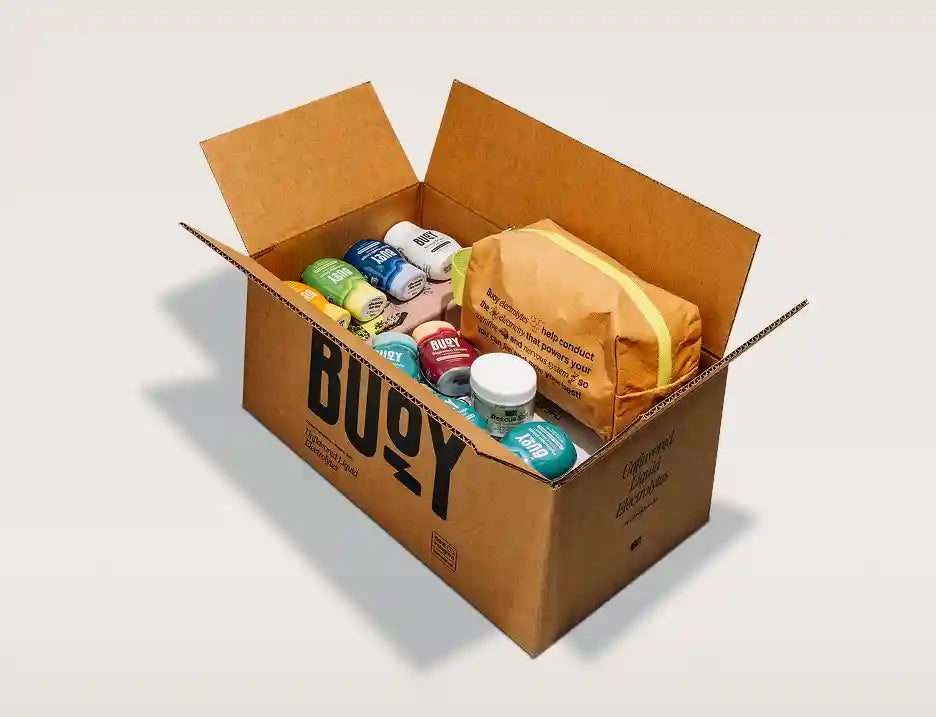
Understanding the Link Between Dehydration and Abdominal Pain
Share
Abdominal Pain and Dehydration: What’s the Connection?
Abdominal discomfort can disrupt your day, and while dietary habits, stress, and digestive conditions are often blamed, dehydration is a lesser-known but significant cause.
Essential Takeaways
- Dehydration is a common but overlooked cause of abdominal pain. A lack of fluids can slow digestion, cause bloating, and lead to cramping.
- Electrolyte imbalances play a role in digestive discomfort. Your gut relies on proper hydration to function smoothly.
- Rehydrating properly can prevent and relieve dehydration-related stomach pain. Hydration Drops, like Buoy, provide a simple way to maintain fluid balance and address symptoms effectively.
A simple lack of fluids can interfere with digestion, leading to various types of stomach pain and discomfort.
- Abdominal Pain and Dehydration: What’s the Connection?
- The Importance of Hydration for Digestive Health
- Rehydration Strategies for Abdominal Pain Relief
- Preventing Abdominal Pain Through Consistent Hydration
- Do You Feel Stomach Pain or Cramps after Drinking Water?
- Hydration Drops That Make a Difference
The Importance of Hydration for Digestive Health
Your digestive system relies on proper hydration to function smoothly. Water helps break down food, absorb nutrients, and move waste efficiently through the intestines. When hydration levels drop, digestive processes slow, leading to constipation, bloating, and cramping.
How Dehydration Affects Digestion and Causes Stomach Pain
When your body lacks fluids, it pulls water from the intestines to maintain other vital functions. This can result in harder stools, slow digestion, and increased bloating. Common digestive issues related to dehydration include:
- Constipation – Less fluid means harder stools, making bowel movements painful.
- Bloating and gas – Slow digestion can lead to fermentation of food in the gut, causing discomfort.
- Cramping and stomach pain – Lack of electrolytes can cause digestive muscles to contract improperly.
Common Symptoms of Dehydration-Related Abdominal Pain
Dehydration often presents subtle symptoms that worsen over time. Signs your stomach pain may be linked to dehydration include:
- Lower abdominal pain after drinking water – If your stomach feels uncomfortable after drinking, your digestive system may be struggling with fluid absorption.
- Cramps after drinking water – Dehydrated intestines may cramp as they absorb fluids too quickly.
- Bloating and discomfort – A lack of water can lead to slower digestion, resulting in trapped gas and bloating.
- Stomach pain when drinking water on an empty stomach – Sudden fluid intake when dehydrated may temporarily irritate the stomach lining.
Electrolyte Imbalance and Nerve Function in Digestion
Your gut muscles rely on electrolytes to function properly. Sodium, potassium, and magnesium regulate contractions in the digestive tract, ensuring food moves smoothly. When dehydration depletes these electrolytes, nerve signals are disrupted, leading to:
- Irregular bowel movements – Dehydration may cause constipation or diarrhoea.
- Delayed stomach emptying – Slower digestion leads to bloating and discomfort.
- Painful muscle spasms – Electrolyte imbalances can cause intestinal cramping.
How to Treat Stomach Cramps from Dehydration
If dehydration is the cause of your stomach pain, rehydration is key. Here’s what you can do:
- Increase Water Intake – Sip small amounts of water throughout the day rather than chugging large amounts at once.
- Consume Electrolyte-Rich Drinks – Adding Hydration Drops like Buoy ensures essential minerals are replenished.
- Incorporate Water-Rich Foods – Fruits like watermelon, oranges, and cucumbers can naturally hydrate your body.
- Avoid Diuretics – Reduce caffeine and alcohol intake to prevent further dehydration.
Rehydration Strategies for Abdominal Pain Relief
While water is essential, electrolyte balance is just as important. Buoy’s Hydrating Wellness Drops provide a scientifically backed mix of sodium, potassium, and magnesium, helping:
- Maintain fluid balance – Preventing dehydration-related digestive issues.
- Support nerve function – Ensuring smooth intestinal contractions.
- Relieve stomach cramps – Magnesium helps relax intestinal muscles, reducing pain.
Preventing Abdominal Pain Through Consistent Hydration

Keeping a consistent hydration routine is the best way to prevent dehydration-related stomach issues. Try these tips:
- Establish a hydration schedule – Drink small amounts of water throughout the day.
- Monitor your urine colour – Pale yellow urine indicates good hydration; dark yellow suggests dehydration.
- Use electrolyte support – Add a squeeze of Buoy’s Hydration Drops to any beverage for daily electrolyte balance.
- Adjust water intake based on activity levels – Increase hydration during exercise or hot weather.
Do You Feel Stomach Pain or Cramps after Drinking Water?
Make sure when you are hydrating you are not drinking too much or too fast, or drinking water that's too cold.
Can IBS Cause Dehydration?
Irritable Bowel Syndrome (IBS) is a chronic digestive disorder that affects how the intestines function, often causing symptoms like bloating, diarrhoea, constipation, and abdominal pain. While IBS itself doesn’t directly cause dehydration, it can contribute to fluid loss and electrolyte imbalances in several ways.
How IBS Can Lead to Dehydration:
- Frequent Diarrhoea – Many IBS sufferers experience bouts of diarrhoea, which can quickly deplete the body’s fluids and essential electrolytes, increasing the risk of dehydration.
- Limited Fluid Absorption – IBS can disrupt how the intestines absorb fluids, especially during flare-ups. This means even if you're drinking enough water, your body may not be retaining it properly.
- Food and Drink Restrictions – Some people with IBS avoid certain foods and drinks that trigger symptoms, including high-fibre foods and certain fruits, which naturally contribute to hydration.
- Increased Sensitivity to Fluids – Some IBS sufferers find that drinking large amounts of water at once can worsen bloating or cramps, leading them to drink less than they should.
How to Stay Hydrated with IBS: If you have IBS and struggle with dehydration, here are some strategies to help maintain hydration without triggering symptoms:
- Drink Smaller Amounts More Frequently – Instead of drinking large amounts of water at once, sip fluids steadily throughout the day.
- Choose Electrolyte-Enhanced Drinks – Replenishing lost minerals with Buoy’s Hydration Drops can help restore balance without added sugars or artificial ingredients.
- Eat Water-Rich Foods – Foods like cucumber, watermelon, and oranges provide hydration while being gentle on digestion.
- Monitor Your Hydration Levels – Pay attention to urine colour and energy levels as indicators of proper hydration.
For those managing IBS, proper hydration is essential to maintaining digestive comfort and preventing dehydration-related complications. If you’re prone to IBS-related dehydration, adding a hydration supplement like Buoy to your routine can be a simple way to ensure your body is absorbing the fluids it needs.
When to Seek Medical Attention
Mild dehydration can be treated at home, but severe or persistent abdominal pain may indicate a more serious issue. Consult a healthcare provider if:
- Pain is severe or persistent
- Additional symptoms like fever, vomiting, or severe bloating occur
- Rehydration doesn’t improve symptoms
Hydration Drops That Make a Difference
Dehydration can easily lead to digestive distress, but preventing it is simple. Hydration isn’t just about drinking water - it’s about ensuring your body retains and uses fluids properly. Buoy’s Hydration Drops make it easy to maintain hydration and electrolyte balance without added sugars or artificial ingredients.
Beyond Water: Up Your Hydration Game with Buoy

If you’re ready to take control of your hydration and prevent dehydration-related stomach pain, try Buoy’s Hydrating Wellness Drops today. Just one squeeze in any drink delivers essential electrolytes, helping you stay hydrated, comfortable, and bloat-free.
Click here to start your hydration journey with Buoy!





